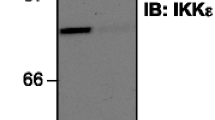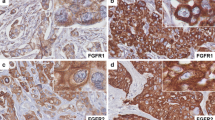Abstract
YKL-40 is a new biomarker in serum with a prognostic value in several localized and metastatic malignancies. The current knowledge regarding the biological functions of YKL-40 in cancer links YKL-40 to increased aggressiveness of the tumor. Utilizing tissue microarrays, YKL-40 protein expression in tumor tissue was assessed by immunohistochemistry in a cohort of 630 high-risk breast cancer patients with a median estimated potential follow-up time of 10 and 13 years for disease-free (DFS) and overall survival (OS), respectively. YKL-40 protein expression was found in malignant tumor cells and in inflammatory cells. High expression was associated with positive estrogen and progesterone receptor status and high tumor differentiation. Contrary to studies on serum YKL-40 as a prognostic biomarker, a high YKL-40 expression in tumor cells was not significantly associated with DSF and OS in univariate and multivariate analyses.



Similar content being viewed by others
References
Johansen JS, Jensen BV, Roslind A (2006) Serum YKL-40, a new prognostic biomarker in cancer patients? Cancer Epidemiol Biomarkers Prev 15:194–202
Johansen JS, Christensen IJ, Riisbro R (2003) High serum YKL-40 levels in patients with primary breast cancer is related to short recurrence free survival. Breast Cancer Res Treat 80:15–21
Jensen BV, Johansen JS, Price PA (2003) High levels of serum HER-2/neu and YKL-40 independently reflect aggressiveness of metastatic breast cancer. Clin Cancer Res 9:4423–4434
Kim SH, Das K, Noreen S, Coffman F, and Hameed M (2007) Prognostic implications of immunohistochemically detected YKL-40 expression in breast cancer. World J Surg Oncol. doi:10.1186/1477-7819-5-17
Pelloski CE, Mahajan A, Maor M (2005) YKL-40 expression is associated with poorer response to radiation and shorter overall survival in glioblastoma. Clin Cancer Res 11:3326–3334
Pelloski CE, Ballman KV, Furth AF (2007) Epidermal growth factor receptor variant III status defines clinically distinct subtypes of glioblastoma. J Clin Oncol 25:2288–2294
Phillips HS, Kharbanda S, Chen R (2006) Molecular subclasses of high-grade glioma predict prognosis, delineate a pattern of disease progression, and resemble stages in neurogenesis. Cancer Cell 9:157–173
Aronson NN, Blanchard CJ, Madura JD (1997) Homology modeling of glycosyl hydrolase family 18 enzymes and proteins. J Chem Inf Comput Sci 37:999–1005
Volck B, Price PA, Johansen JS (1998) YKL-40, a mammalian member of the chitinase family, is a matrix protein of specific granules in human neutrophils. Proc Assoc Am Physicians 110:351–360
Renkema GH, Boot RG, Au FL (1998) Chitotriosidase, a chitinase, and the 39-kDa human cartilage glycoprotein, a chitin-binding lectin, are homologues of family 18 glycosyl hydrolases secreted by human macrophages. Eur J Biochem 251:504–509
Rehli M, Krause SW, Andreesen R (1997) Molecular characterization of the gene for human cartilage gp-39 (CHI3L1), a member of the chitinase protein family and marker for late stages of macrophage differentiation. Genomics 43:221–225
Johansen JS, Williamson MK, Rice JS (1992) Identification of proteins secreted by human osteoblastic cells in culture. J Bone Miner Res 7:501–512
Junker N, Johansen JS, Hansen LT (2005) Regulation of YKL-40 expression during genotoxic or microenvironmental stress in human glioblastoma cells. Cancer Sci 96:183–190
Morrison BW, Leder P (1994) neu and ras initiate murine mammary tumors that share genetic markers generally absent in c-myc and int-2-initiated tumors. Oncogene 9:3417–3426
Junker N, Johansen JS, Andersen CB (2005) Expression of YKL-40 by peritumoral macrophages in human small cell lung cancer. Lung Cancer 48:223–231
Roslind A, Johansen JS, Junker N et al (2007) YKL-40 expression in benign and malignant lesions of the breast: a methodologic study. Appl Immunohistochem Mol Morphol 15:371–381
Recklies AD, White C, Ling H (2002) The chitinase 3-like protein human cartilage glycoprotein 39 (HC-gp39) stimulates proliferation of human connective-tissue cells and activates both extracellular signal-regulated kinase- and protein kinase B- mediated signalling pathways. Biochem J 365:119–126
Pelloski CE, Lin E, Zhang L (2006) Prognostic associations of activated mitogen-activated protein kinase and akt pathways in glioblastoma. Clin Cancer Res 12:3935–3941
Malinda KM, Ponce L, Kleinman HK (1999) Gp38k, a protein synthesized by vascular smooth muscle cells, stimulates directional migration of human umbilical vein endothelial cells. Exp Cell Res 250:168–173
Nishikawa KC, Millis AJ (2003) gp38k (CHI3L1) is a novel adhesion and migration factor for vascular cells. Exp Cell Res 287:79–87
Bigg HF, Wait R, Rowan AD (2006) The mammalian chitinase-like lectin, YKL-40, binds specifically to type I collagen and modulates the rate of type I collagen fibril formation. J Biol Chem 281:21082–21095
Nangia-Makker P, Conklin J, Hogan V (2002) Carbohydrate-binding proteins in cancer, and their ligands as therapeutic agents. Trends Mol Med 8:187–192
Fusetti F, Pijning T, Kalk KH (2003) Crystal structure and carbohydrate-binding properties of the human cartilage glycoprotein-39. J Biol Chem 278:37753–37760
Mohanty AK, Singh G, Paramasivam M (2003) Crystal structure of a novel regulatory 40 kDa mammary gland protein (MGP-40) secreted during involution. J Biol Chem 278:14451–14460
Rejman JJ, Hurley WL (1988) Isolation and characterization of a novel 39 kilodalton whey protein from bovine mammary secretions collected during the nonlactating period. Biochem Biophys Res Commun 150:329–334
Ejlertsen B, Mouridsen HT, Jensen MB (2007) Improved outcome from substituting methotrexate with epirubicin: results from a randomised comparison of CMF versus CEF in patients with primary breast cancer. Eur J Cancer 43:877–884
Knoop AS, Knudsen H, Balslev E (2005) Retrospective analysis of topoisomerase IIa amplifications and deletions as predictive markers in primary breast cancer patients randomly assigned to cyclophosphamide, methotrexate, and fluorouracil or cyclophosphamide, epirubicin, and fluorouracil: Danish Breast Cancer Cooperative Group. J Clin Oncol 23:7483–7490
Tavassoli FA and Devilee P (eds) (2003) World Health Organization Classification of Tumours. Pathology and genetics of tumours of the breast and female genital organs. IARC Press, Lyon
Elston CW, Ellis IO (1991) Pathological prognostic factors in breast cancer. The value of histological grade in breast cancer: experience from a large study with long-term follow-up. Histopathology 19:403–410
Hudis CA, Barlow WE, Costantino JP (2007) Proposal for standardized definitions for efficacy end points in adjuvant breast cancer trials: the STEEP system. J Clin Oncol 25:2127–2132
Schemper M, Smith TL (1996) A note on quantifying follow-up in studies of failure time. Control Clin Trials 17:343–346
Kononen J, Bubendorf L, Kallioniemi A (1998) Tissue microarrays for high-throughput molecular profiling of tumor specimens. Nat Med 4:844–847
Camp RL, Charette LA, Rimm DL (2000) Validation of tissue microarray technology in breast carcinoma. Lab Invest 80:1943–1949
Torhorst J, Bucher C, Kononen J (2001) Tissue microarrays for rapid linking of molecular changes to clinical endpoints. Am J Pathol 159:2249–2256
Ransohoff DF (2004) Rules of evidence for cancer molecular-marker discovery and validation. Nat Rev Cancer 4:309–314
Ransohoff DF (2005) Bias as a threat to the validity of cancer molecular-marker research. Nat Rev Cancer 5:142–149
Baselga J (2001) Is circulating HER-2 more than just a tumor marker? Clin Cancer Res 7:2605–2607
Dorigo O, Berek JS (2007) CA125: megadaltons of novel opportunities. Gynecol Oncol 104:505–507
Hormigo A, Gu B, Karimi S (2006) YKL-40 and matrix metalloproteinase-9 as potential serum biomarkers for patients with high-grade gliomas. Clin Cancer Res 12:5698–5704
Qin W, Zhu W, Schlatter L (2007) Increased expression of the inflammatory protein YKL-40 in precancers of the breast. Int J Cancer 121:1536–1542
Roslind A, Johansen JS, Christensen IJ, Bentzen J, Balslev E, Kiss K, Nielsen DL, Price PA, Andersen E (2007) High serum levels in patients with squamous cell carcinoma of the head and neck is associated with short survival. Int J Cancer. doi:10.1002/ijc.23152
Ringsholt M, Hogdall EV, Johansen JS (2007) YKL-40 protein expression in normal adult human tissues—an immunohistochemical study. J Mol Histol 38:33–43
Kzhyshkowska J, Gratchev A, Goerdt S (2007) Human chitinases and chitinase-like proteins as indicators for inflammation and cancer. Biomarker Insights 2:128–146
Ben Baruch A (2003) Host microenvironment in breast cancer development: inflammatory cells, cytokines and chemokines in breast cancer progression: reciprocal tumor-microenvironment interactions. Breast Cancer Res 5:31–36
Lewis CE, Pollard JW (2006) Distinct role of macrophages in different tumor microenvironments. Cancer Res 66:605–612
Acknowledgments
We thank Hanife Dzaferi, Department of Pathology, Herlev University Hospital, for the skillful construction of TMAs and immunohistochemical staining of all samples. Stine Joergensen, Department of Pathology, Herlev University Hospital, is thanked for technical assistance with the immunostainings. Lise Lotte Thyme, Department of Pathology, Herlev University Hospital, is thanked for technical assistance with the double-labeling method. Keld B. Ottosen, The Panum Institute, is thanked for the final layout of Fig. 2. We also thank the Danish Departments of Oncology and Pathology for participating in collection of patient data and tumor samples. The study was supported by grants from The Astrid Thaysen Foundation, The Erichsen Family Foundation, Desirée and Niels Yde Foundation, and Vera and Carl Johan Michaelsen Foundation.
Author information
Authors and Affiliations
Corresponding author
Rights and permissions
About this article
Cite this article
Roslind, A., Knoop, A.S., Jensen, MB. et al. YKL-40 protein expression is not a prognostic marker in patients with primary breast cancer. Breast Cancer Res Treat 112, 275–285 (2008). https://doi.org/10.1007/s10549-007-9870-7
Received:
Accepted:
Published:
Issue Date:
DOI: https://doi.org/10.1007/s10549-007-9870-7




